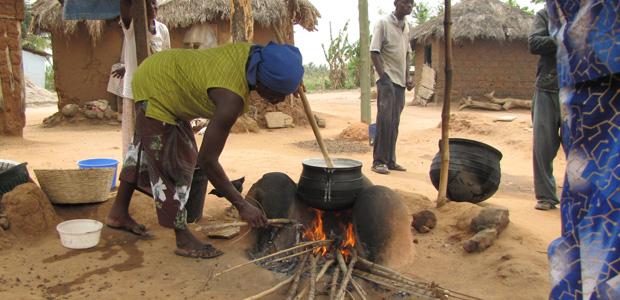Clean cookstoves protect women and the environment
A woman in Ghana cooks over a traditional, open fire. (Photo courtesy of the Global Alliance for Clean Cookstoves)
Getting individuals to change their behavior for the good of the planet can be a hard sell. Whether it's encouraging homeowners to use compact fluorescent bulbs or convincing drivers to buy hybrid cars, environmentalists have learned that the best approach is often an appeal to self-interest. That's the tactic an environmental group in Africa is using to persuade women to change the way they cook. Ari Daniel Shapiro of our partner program NOVA has the story from Uganda.
Sister Bridget Kokiambo rests a pot on top of three stones the size of bowling balls. She's in the small, dark kitchen of Providence Home, a school and residence for those with disabilities in the Ugandan village of Nkokonjeru. She points to the space in between the stones. That's where the firewood goes.
"We make the fire so that it can burn and cook," she says.
The inside walls are black with soot. "There is no pipe to take out the smoke," she explains.
This is how nearly 3 billion people in the developing world cook their food and heat their homes, with dirty, inefficient stoves that billow smoke. They cause health problems — such as emphysema, heart disease, and lung cancer — for those who use them. The black soot is also bad for the climate; it's a greenhouse pollutant that helps warm the planet. And because these stoves are inefficient, they require a lot of firewood, which contributes to deforestation.
One solution that's being promoted here and elsewhere is a cleaner cookstove.
Clearing the Air
Confrio Nsubuga works for an environmental group in Uganda called JEEP (Joint Energy and Environment Projects). It's one of many organizations in the developing world that are promoting more efficient cookstoves. Nsubuga's version sits in the corner of his kitchen in the village of Bumbajja. His wife blows on the kindling, and the flames flare up, lapping at the wood.
"What makes it efficient is the way it is constructed," he says.
The stove is nothing fancy. In fact, Nsubuga's organization doesn't sell the stoves. It teaches people to build them. The stove is made from clay. It's squat and rectangular. A couple of pots sit on top, and there's a hole at the base where the firewood goes.
"As you see now, there is only one piece of firewood," he says.
A single piece of firewood can heat up the whole unit, so the stove is energy-efficient, and no smoke wafts into the kitchen. It's all diverted through an aluminum chimney. This stove may be better for the environment, but it's different from what locals are accustomed to, so getting people to use it can be a challenge.
"There may be well-intentioned individuals and organizations that have developed good, clean, efficient stoves, but they haven't taken into account how those stoves may be used on a day-to-day basis," says Radha Muthiah, executive director of the Global Alliance for Clean Cookstoves.
Some people resist switching to the new stoves because they believe that food tastes better when cooked over a traditional, open fire.
Less Wood, More Security
In Uganda, Confrio Nsubuga has noticed that people can be reluctant to adopt his clean cookstoves, so he's trying a different tactic to convince women to make the switch. He's pitching the clean cookstoves not as a way to protect the environment, but as a way for women to protect themselves. To explain, he escorts me into the forest behind his home at dusk.
"This is where people get firewood," he says.
The forest is dark and filled with the sounds of insects. We peer through the trees and can just make out someone using an axe to cut down branches and tree trunks. Nsubuga says it's usually women and children who collect firewood in the forests, and this can be a dangerous place for them. The greenery is so thick, someone could easily hide and watch you. And the din of the forest masks even nearby sounds. Inside forests like this, rape and sexual assault are common. In one region of Uganda, 20 to 30 percent of gender-based violence incidents are estimated to occur when women are out collecting firewood.
"So if you have a more efficient stove, then that certainly reduces the number of times that the women have to go out and make that trek," says Muthiah of the Global Alliance for Clean Cookstoves.
And this is one way the Ugandan environmental group JEEP is promoting its clean stoves. It says they translate into less time in the forest, which means a lower risk of rape and sexual assault. The argument appealed to 65-year-old Jane Nambuli, who lives down the road from the forest in Bumbajja.
"I used to go in the forest to fetch the firewood," she says, "but I thought that I might be raped because most of the women, we are raped."
Now Nambuli has one of the new stoves, and she says she feels safer. In fact, she uses so little wood that she's able to grow most of what she needs in her own yard. Nambuli smiles as she lifts a cover made of banana leaves off a pot on her new stove. Inside there's rice and sweet potatoes, which she and her family have just eaten for lunch. The food is hot, the air inside her home is clean, and she didn't have to venture into the forest.
